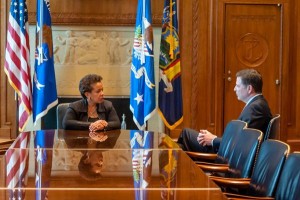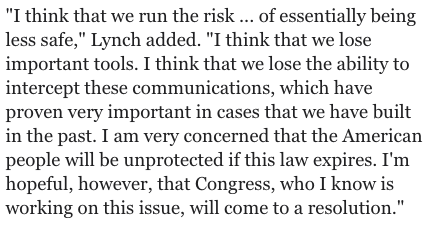 Loretta Lynch is an excellent nominee for Attorney General, and her prior actions in whitewashing the blatant and rampant criminality of HSBC should not be held against her, because she didn’t know that at the time she last whitewashed that criminal enterprise, right?
Loretta Lynch is an excellent nominee for Attorney General, and her prior actions in whitewashing the blatant and rampant criminality of HSBC should not be held against her, because she didn’t know that at the time she last whitewashed that criminal enterprise, right?
No. Nothing could be further from the truth.
This is a cop out by Lynch’s advocates. Lynch either knew, or damn well should have known. She signed off on the HSBC Deferred Prosecution Agreement (DPA), if she was less than fully informed, that is on her. That is what signing legal documents stands for….responsibility. Banks like HSBC, Credit Suisse, ING etc were, and still are, a cesspool of criminal activity and avoidance schemes. Willful blindness to the same old bankster crimes by Lynch doesn’t cut it (great piece by David Dayen by the way).
But, all the above ignores the Swiss Alps sized mountains of evidence that we know Lynch was aware of and blithely swept under the rug by her HSBC DPA. So, we are basically left to decide whether Lynch is a bankster loving toady that is her own woman and cravenly whitewashed this all on her own, or whether she is a clueless stooge taking orders to whitewash it by DOJ Main. Both views are terminally unattractive and emblematic of the oblivious, turn the other cheek to protect the monied class, rot that infects the Department of Justice on the crimes of the century to date.
And that is only scratching the real surface of my objections to Lynch. There are many other areas where Lynch has proven herself to be a dedicated, dyed in the wool “law and order adherent” and, as Marcy Wheeler artfully coined, “executive maximalist”. Lynch’s ridiculous contortion, and expansion, of extraterritorial jurisdiction to suit the convenient whims of the Obama Administration’s unparalleled assault on the Rule of Law in the war on terror is incredibly troubling. Though, to be fair, EDNY is the landing point of JFK International and a frequent jurisdiction by designation. Some of these same questions could have been asked of Preet Bharara (see, e.g. U.S. v. Warsame) Loretta Lynch has every bit the same, if not indeed more, skin in the game as Bharara, whether by choice or chance.
Lynch has never uttered a word in dissent from this ridiculous expansion of extraterritorial jurisdiction. Lynch’s record in this regard is crystal clear from cases like US v. Ahmed, Yousef, et. al. where even Lynch and her office acknowledged that their targets could not have “posed a specific threat to the United States” much less have committed specific acts against the US.
This unconscionable expansion is clearly all good by Lynch, and the ends justify the means because there might be “scary terrists” out there. That is just dandy by American “executive maximalists”, but it is toxic to the Rule of Law, both domestically and internationally (See, supra). If the US, and its putative Attorney General, are to set precedents in jurisdictional reach on common alleged terroristic support, then they ought live by them on seminal concerns like torture and war crimes under international legal norms. Loretta Lynch has demonstrated a proclivity for the convenience of the former and a toady like disdain for the latter.
And the same willingness to go along to get along with contortion of the Rule of Law in that regard seems beyond certain to extend to her treatment of surveillance issues and warrant applications, state secrets, over-classification, attack on the press and, critically, separation of powers issues. Those types of concerns, along with how the Civil Rights Division is utilized to rein in out of control militarized cops and voting rights issues, how the OLC stands up to Executive overreach, whether OPR is allowed to continue to shield disgraceful and unethical AUSAs, and whether she has the balls to stand up to the infamously insulated inner Obama circle in the White House. Do you really think Loretta Lynch would have backed up Carolyn Krass and OLC in telling Obama no on the Libyan War Powers Resolution issue?
For my part, I don’t think there is a chance in hell Lynch would have stood up to Obama on a war powers, nor any other critical issue, and that is a huge problem. Krass and Holder may have lost the Libyan WPR battle, but at least they had the guts to stand up and say no, and leave a record of the same for posterity.
That is what really counts, not the tripe being discussed in the press, and the typically preening clown show “hearing” in front of SJC. That is where the rubber meets the road for an AG nominee, not that she simply put away some mobsters and did not disgrace herself – well, beyond the above, anyway (which she absolutely did) – during her time as US Attorney in EDNY. If you are a participant in, or interested observer of, the criminal justice system as I am, we should aspire to something better than Eric Holder. Holder may not have been everything hoped for from an Obama AG when the Administration took office in January of 2009, but he was a breath of fresh air coming off the AG line of the Bush/Cheney regime. Loretta Lynch is not better, and is not forward progress from Holder, indeed she is several steps down in the wrong direction. That is not the way to go.
The fact that Loretta Lynch is celebrated as a great nominee by not just Democrats in general, but the so called progressives in specific, is embarrassing. She is absolutely horrible. If Bush had put her up for nomination, people of the progressive ilk, far and wide, would be screaming bloody murder. Well, she is the same person, and she is a terrible nominee. And that does not bode well for the Rule of Law over the remainder of the Obama Administration.
And this post has not even touched on more mundane, day to day, criminal law and procedure issues on which Lynch is terrible. And horrible regression from Eric Holder. Say for instance pot. Decriminalization, indeed legalization, of marijuana is one of the backbone elements of reducing both the jail and prison incarceration rate, especially in relation to minorities. Loretta Lynch is unconscionably against that (See, e.g., p. 49 (of pdf) et. seq.). Lynch appears no more enlightened on other sentencing and prison reform, indeed, she seems to be of a standard hard core prosecutorial wind up law and order lock em up mentality. Lynch’s positions on relentless Brady violations by the DOJ were equally milquetoast, if not pathetic (See, e.g. p. 203 (of pdf) et. seq.). This discussion could go on and on, but Loretta Lynch will never come out to be a better nominee for Attorney General.
Observers ought stop and think about the legal quality, or lack thereof, of the nominee they are blindly endorsing. If you want more enlightened criminal justice policy, to really combat the prison state and war on drugs, and to rein in the out of control security state and war on terror apparatus, Loretta Lynch is a patently terrible choice; we can, and should, do better.
 For two years, a key pushback strategy against those complaining about the phone dragnet program collecting records of every single American has been to falsely claim that opponents of the dragnet were claiming the dragnet collected content.
For two years, a key pushback strategy against those complaining about the phone dragnet program collecting records of every single American has been to falsely claim that opponents of the dragnet were claiming the dragnet collected content.

